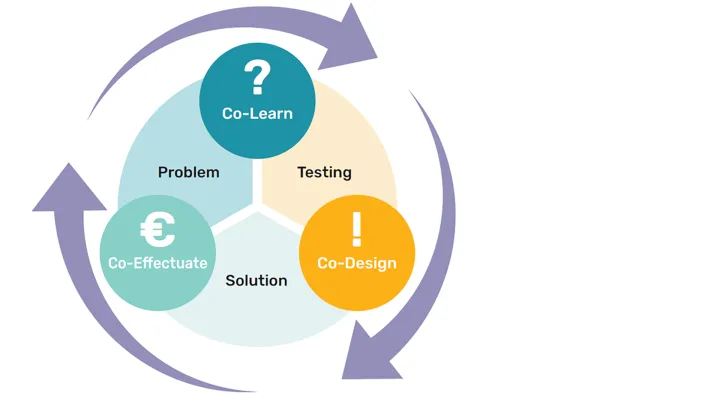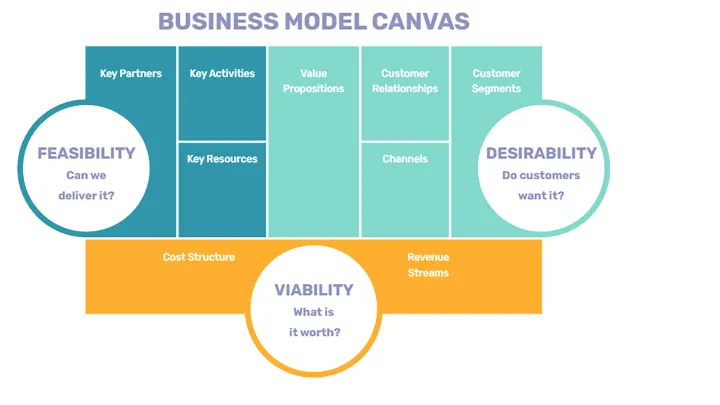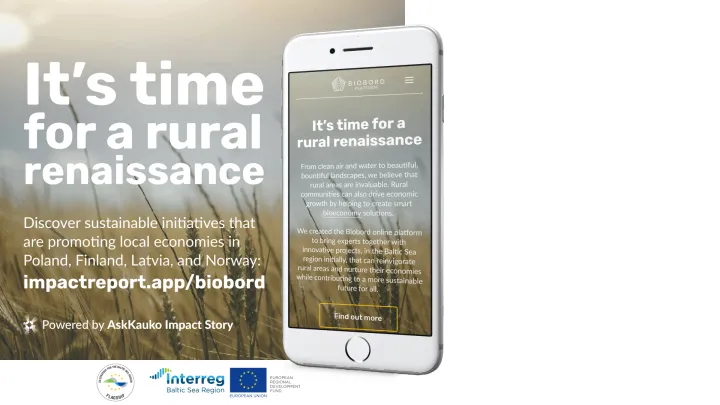RDI2CluB and Biobord Pilots
Regional and transnational pilot cases have been conducted to support development of knowledge-based bioeconomy and to test the transnational co-creation and innovation process. Here are the descriptions and findings of the pilots.
In the extension project ConnectedByBiobord,three international pilots around food forest and use of new technologies in the wild life monitoring were implemented according to jointly selected iterative innovation process, together with strong stakeholder engagement:
- Co-learning (definition of problems and solutions)
- Co-design (testing, piloting, validating solutions); and
- Co-effectuate (analyzing viability, desirability, and feasibility).

Read the Summary of Workshop on Innovation Working Methods (pdf)
The innovation pilots connected expert teams and stakeholders from at least three regions and countries to work together on defining and solving innovation challenges in the field of bioeconomy. All co-working took place completely online. A practical innovation process guide was formulated from the piloting experiences and learnt lessons. The guide elaborates on the experiences of these practitioners when applying the innovation process and selected working methods for creative co-working in international teams and for building stakeholder dialogue in online setting.
Innovation guide is a tool for us in the Biobord Network that supports planning and implementing future co-operation initiatives and projects as well as the co-working on our joint agendas. Three thematic joint agendas were co-created as main outputs of the project. Joint agendas are also practical tools, roadmaps, to guide the future co-operation of the network, around selected themes. Themes were sustainable food system, digital forestry and use of new technologies in the wild life and free ranging livestock monitoring. Additionally one joint agenda was formulated to steer the future actions of the Biobord network, Biobord Network Agenda.
Read the Innovation process guide (pdf)
All joint agendas were co-created with the assistance of ready-made Business Model canvas -template, to make the plans approachable and easy to understand. The Joint Agenda Canvas offers a tool for defining the feasibility, viability, and desirability of a network initiative, and adapted is to present and assess a network process.

Food innovation pilot
In the food innovation pilot, a transnational team was solving challenges together with region’s SMEs related to alternative proteins and functional foods. Involved partners were: Vidzeme Planning Region (LV), Krinova Incubator and Science Park (SWE), SEI Tallinn (EST), Pärnu region (EST) and JAMK University of Applied Sciences. Selected methods included a wide scale innovation event Food Hack by Biobord (March 2021) and a follow-up webinar (April 2021). Experiences were collected to the innovation process guide, but also to a vlog.
Additionally a thematic analysis was written for wider description of the needs and opportunities of the more sustainable food system.
Joint agenda of sustainable food system
Forest innovation pilot
The forest innovation pilot focused on finding the missing links and opportunities from the wood value chain from forest to industry. The transnational team consisted on following project partners: Tretorget (NO), Paper Province (SWE), Inland Norway University of Applied Sciences (NO) and JAMK University of Applied Sciences (FI). In the forest pilot, a hackathon called Forest Hack by Biobord was also arranged in April 2020 to find solutions to the challenges of the forest value chain data gaps, as well as to network actors together. A vlog was also formulated from the experiences of the hackers.
Additionally a technology report was complied to describe the operating field in the partner regions, as well as to elaborate the challenges and potential.
Joint agenda of digital forestry
Technology innovation pilot
Partners from Finland, Norway, Latvia, and Poland collaborated to develop new technological approaches for monitoring of large-bodied wild animals and free-ranging live-stock. Partners were Institute for Environmental Solutions (LV), Inland Norway University of Applied Sciences (NO), JAMK University of Applied Sciences (FI) and PRO Civis (PL). The continues aim is to improve data-based decision-making in wild-life management. As a part of this process, the partners reviewed existing capabilities of various remote sensing technologies and assessed their potential.
Read the Analysis of remote sensing technologies (pdf)
Furthermore, field demonstrations are carried out in Norway, Latvia and Finland to study the use of drones for data collection. Engaged stakeholders involve hunters’ associations, forest owners’ associations, technology providers and researchers from Norway, Latvia, Finland and Poland. A digital learning material was complied from the field demonstration experiences.
Joint agenda for the use of new technologies in the wild life monitoring
If you find our joint agendas interesting, don’t hesitate to contact us on Biobord!
RDI2CluB local pilots
The RDI2CluB-project conducted local pilots 2019-2020 with several purposes on mind:
- to test the applicability of open innovation and co-creation principles and the added value of a digital platform for the development of different types of business ideas and social innovations in the RDI2CluB bioeconomy regions.
- to contribute to the implementation of bioeconomy-related smart specializations of the RDI2CluB project regions.
- to facilitate the development of transnationally oriented bioeconomy innovation ecosystem in the partner regions and the Baltic Sea Region as a whole
Here you may find an interactive impact report that describes the local pilot cases and their results in a visual manner. The Impact Report showcases solutions developed as a result of transnational cooperation and co-creation among the bioeconomy regions of Central Finland, Inland Region in Norway, Świętokrzyskie Voivodeship in Poland, Vidzeme Region in Latvia, and Estonia. It has been created in close cooperation with the Finnish start-up company AskKauko and it features a new approach that blends storytelling, visuality, open data and interactivity.
https://www.impactreport.app/biobord/
Central Finland
CHALLENGE: Agriculture is a seasonal business and faces industry-specific challenges. For example, cropping needs to be performed at the right time and by the right people, in order to success, and the need for labor work requirements has changed into more seasonal sort. This set-up is challenging due to lack of regional labor work, long distances and spread location of farms and it hinders the development of bioeconomy in the rural areas.
OUR SOLUTION: RDI2CluB-partner, business development company of Saarijärvi City, SSYP Kehitys Ltd. has developed a solution for the problem; Waakku - a mobile application for connecting rural entrepreneurs with services and workforce. While there are workforce and service apps available, this solution is focused on farmers in rural areas. Waakku aims to get the right person at the right time to the right place. It will feature a location-based map as well as capacity for information sharing.
As farms, service providers and the workforce become better connected, a drop in logistics and management costs can be expected. The app will help to develop the regional bioeconomy innovation ecosystem by facilitating the gig economy and co-operation of farms. This way skilled workers will become more accessible, and with their knowledge they will help to transform traditional business models. Waakku has been tested on functionalities with a local farmer group in 2019-2020 and the app was seen as useful and 90% of its users were happy with it. The up taking and upkeeping of Waakku would require an active party and wide dissemination.
Inland, Norway
CHALLENGE: Many grouse species roam huge areas and hence the increased hunting tourism may lead to overexploitation, conflicts, and limited value creation in rural areas. Additionally, climate change creates new uncertainties. Rural landowners need to organize grouse monitoring and improve the management systems, in order to take advantage of hunting tourism, without over-exploiting natural resources and destroying future business potential. Besides maintaining area's biodiversity, there is a need among landowners and policy makers, for unified data on grouse population. The lack of unified data limits the growth of the local bioeconomy as policy makers cannot make evidence-based policies on species sustainability and local SMEs cannot co-operate to provide new and higher value offerings.
OUR SOLUTION: The Inland Norway University of Applied Sciences is leading the development of an international network for grouse monitoring and research. It will be available for the whole Northern hemisphere and will involve key stakeholders from business, management, and science. The coordination platform hosted on the Biobord-platform, will enable to collaborate on standards, tools, and data sets. Scientists will benefit from open access data and will be able to co-operate with policymakers to develop sustainable frameworks, thereby aiding local landowners and tourism companies (accommodation, tour guides, hunters’ groups, etc.) who will have provided the initial data. The international cross-sectoral network is designed to ensure that it can be transferred and replicated to other bioeconomic issues beyond the initial focus on grouse.
Świętokrzyskie Voivodeship, Poland
CHALLENGE: Rural areas particularly suffer from a lack of infrastructure, financing, and awareness of the latest climate-friendly energy alternatives. The prevalent heating systems in the rural areas are household coal heaters. Dated heaters and the use of poor-quality coal or burning of waste add to the problem. These energy systems cause harmful air pollution causing numerous health issues. In winter months, the air quality is detrimental to all, but particularly to health tourism orientated regions such as the spa areas of Świętokrzyskie Voivodeship.
OUR SOLUTION: The Regional Science and Technology Center from Poland piloted research and community engagement actions to encourage inhabitants to upgrade their energy systems. Recently developed drone technologies were adapted to collect regular samples on air quality, thereby providing location specific data in addition to the existing stationary air pollution measurement stations. Moreover, a review of emission reducing energy alternatives was carried out with targeted awareness activities. These actions are expected to have a positive impact on local health, reduce greenhouse gas emissions, contribute towards data-based policy, and encourage local businesses' participation in the provision of low-emission heating solutions. The data collected from the pilot was delivers to local decision makers to support their actions.
Vidzeme Region, Latvia
CHALLENGE: The agricultural sector faces a growing number of problems that are linked to each other and the effectiveness of previous management practices needs to be revaluated. We are facing problems such as:
- Global climate change generates increasingly unstable weather such as longer droughts and periods of short but intense rainfall.
- Increasing population. Continuous population growth demands more food, while available space for agricultural expansion is decreasing.
- Sustainability of production process. Production processes should not create adverse effects on health (consumption of harmful chemicals), environment (water pollution and loss of biodiversity) and future farming (reduced soil fertility and release of greenhouse gasses).
OUR SOLUTION: Institute for Environmental Solutions (IES) from Latvia developed a decision-making support tool for agricultural primary production enterprises and farms by utilising the technological opportunities offered by sensor-equipped drones. Based on numerous consultations with farmers, the tool was decided to focus on the rapid crop yield volume estimates, plant health assessment, identification of weeds, soil temperature assessment, evaluation of underground irrigation systems and identification of plant blooming success. Furthermore, the tool was geared towards organically grown medicinal and aromatic plants as there are existing solutions for conventional crops, and organic farms are more environmentally friendly while face higher management costs. The piloting action had a positive impact on national and regional development strategies that already has selected knowledge intensive bioeconomy and information communication technology (ICT) as key specialisation areas.
Innovation Process Piloting
In the extension project ConnectedByBiobord, 3 international pilots were implemented:
- Food innovation pilot
- Forest innovation pilot
- Technology innovation pilot
Food innovation Pilot
In the food innovation pilot, a transnational team from Latvia, Sweden, Finland, and Estonia are solving challenges together with region’s SMEs related to alternative proteins and functional foods. Selected innovation method is a hackathon. In the Food Hack by Biobord, food companies are solving within 24 hours five jointly recognized challenges around the themes. Industry experts are supporting the innovation process as coaches and results will be openly shared with the public. Winning team continues to 2nd round and gets to take their innovation even further.
Forest innovation pilot
The forest innovation pilot focuses on finding the missing links and opportunities from the wood value chain from forest to industry. The transnational team consists of project partners and industry stakeholders from Finland, Sweden, and Norway. Piloting process started with a Forest Technology Analysis to describe and compare regional practices and methods for collecting and managing the data flows in forestry. Stakeholder webinar was organized to identify gaps and potential for managing data flows from stem to product in the forest sector. Thereafter, in a hackathon event, transnational teams solve these recognized gaps and find potential solutions. Engaged stakeholders involve sectoral agencies, SMEs, R&D representatives from Norway, Sweden and Finland.
Read the Forest technology analysis report (pdf)
Technology innovation pilot
Partners from Finland, Norway, Latvia, and Poland have been collaborating to develop new technological approaches for monitoring of large-bodied wild animals and free-ranging live-stock. The aim is to improve data-based decision-making in wild-life management. As a part of this process, the partners reviewed existing capabilities of various remote sensing technologies and assessed their potential. Furthermore, field demonstrations are carried out in Norway, Latvia and Finland to study the use of drones for data collection. Engaged stakeholders involve hunters’ associations, forest owners’ associations, technology providers and researchers from Norway, Latvia, Finland and Poland.
For more details, visit Biobord.eu
